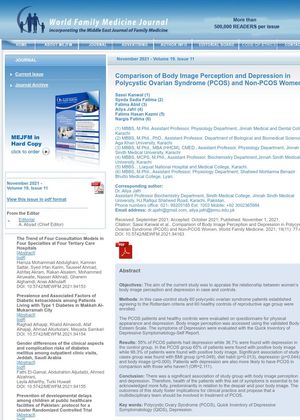Comparison of Body Image Perception and Depression in Polycystic Ovarian Syndrome and Non-PCOS Women
November 2021
in “
World Family Medicine Journal /Middle East Journal of Family Medicine
”

TLDR Women with PCOS are more likely to experience depression and have a negative body image compared to women without PCOS.
The study titled "Comparison of Body Image Perception and Depression in Polycystic Ovarian Syndrome (PCOS) and Non-PCOS Women" involved 60 women with PCOS and 60 healthy controls. The study found that 55% of PCOS patients had depression, compared to 36.7% in the control group. Additionally, 65% of PCOS patients had a positive body image, compared to 98.3% in the control group. The study found a significant association between the study group and body mass index (BMI), diet habits, depression, and body image. The study concluded that there is a significant association between PCOS, depression, and body image perception. The results suggest that a multidisciplinary team should be involved in the treatment of PCOS.






